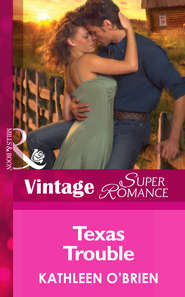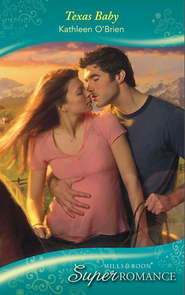По всем вопросам обращайтесь на: info@litportal.ru
(©) 2003-2025.
✖
The Real Father
Автор
Год написания книги
2018
Настройки чтения
Размер шрифта
Высота строк
Поля
Molly looked across Radway’s large, well-equipped playground now, drawing comfort from the sight of her daughter. Liza’s smile had brought sunshine into some of the darkest days of Molly’s life.
Liza hadn’t noticed her mother and Miss Kilgore standing at the fringe of the playground. She was busy hoisting a smaller child onto a swing. Both little girls giggled as Liza lowered the safety bar, gave the child a push and then stood back, her wispy blond hair flying in the February wind, her cheeks as red as her winter coat.
The coat was getting too short, Molly noticed absently. Liza’s legs seemed to stretch by inches every day. It was impossible to keep her in clothes that fit. Her lurching growth spurts seemed to promise that she would be dramatically tall and slim.
Just like her father.
“What a cutie,” Miss Kilgore said, sighing. “You must be very proud of her.”
Molly didn’t answer right away, struggling to subdue the absurd tightness that had overtaken her vocal cords at the sight of Liza’s long, coltish legs.
The answer was easy, if only she’d been able to control her voice enough to speak it. Yes, Molly was proud. These past nine years—first struggling as a frightened teenage mother to bring up her newborn daughter alone, then going to school at night, and finally piecing together a career and a business as a landscape architect—had been almost unimaginably difficult.
Some nights she’d been so lonely she’d talked to the walls. Some days she’d been so tired she wanted to cry. But she hadn’t wept. She had endured it, all of it. She had fought the odds, and she had won.
And Liza made it all worthwhile. Her little girl was smart, sweet, amazingly courageous. She was everything Molly had hoped she’d be. Everything Molly herself had not been—not at nine, not at nineteen, not ever. Not even now, at almost twenty-nine. For Molly, the daughter of a resentful, alcoholic father, being brave was still very much a decision, not an instinct.
So how could Molly help being proud? She had taken her one small talent, a gift for growing things, and she had turned it into a career so successful that she and her daughter wanted for nothing.
Well, nothing but a new coat. She blew Liza a kiss and made a mental note to buy her the most beautiful red coat in all of South Carolina.
“She’s a fantastic kid,” Molly said finally, turning back to Miss Kilgore. To heck with false modesty. She let her joy in her daughter break through in a wide smile. “I consider myself very, very lucky.”
“You are. Believe me, they’re not all like that.” Miss Kilgore seemed to have been born with a smile on her face, and she directed her dimpled grin toward Molly. “Would you like to see the rest of the school? The music rooms? The science lab? The swimming pool?” She held out her hands, palms up in refreshing candor. “How can I impress you, Ms. Lorring? I have to admit, I’d love to see Liza at Radway.”
“Call me Molly. And I’m already impressed.”
“Fantastic. I’m Jan. Tommy Cheatwood! Stop that! Put Peggy down this instant!”
Molly was momentarily bewildered, until she realized that Janice Kilgore’s practiced gaze had been scanning the playground even as she wooed and flattered her new candidate. An impish, gap-toothed boy in the corner was holding on to a small, squealing girl’s ankles, guiding her around like a human wheelbarrow.
For one intense moment his blond hair and green eyes, his irreverent grin, his animal pleasure in his mischief, reminded her forcibly of the Forrest twins. Well, Jackson Forrest, perhaps. Beau had never looked quite that cocky and defiant.
At the sound of his teacher’s voice, Tommy looked over, grimaced, and let go, plopping Peggy into the sand without ceremony. His face sobered, and the fleeting impression disappeared. Molly breathed again.
Jan rolled her eyes and turned back to Molly. “So you’re impressed. Good. Now before one of my beloved monsters does something to turn you off, shall we just move right along to the ceremonial signing of the contract?”
Molly shook her head. “It’s a little early for that,” she said, smiling.
Jan sighed, her cheerful face coming as close to somber as her snub nose and freckles would allow. “Already heard about the tuition, have you? I know it’s a heart stopper, but we’re not offering just snob appeal here, Molly. We can give Liza the education she deserves. Even tossing aside the sales pitch, we really are the best.”
“I believe you.” And she did. Molly had been born here in Demery. She’d grown up here. There weren’t many social, political, economic or even academic nuances that she didn’t grasp. Jan wasn’t exaggerating: If you lived in Demery, Radway School was the best.
But that was the catch. If you lived in Demery. At the moment, Molly and Liza lived in Atlanta. Even if she accepted the Everspring restoration job, she would be here only a couple of months.
“It’s not the tuition,” Molly explained. “My plans are really still up in the air. I haven’t even committed yet to taking the job.”
Janice looked confused. “But when Miss Forrest called, she said…she seemed to think it was all settled.”
“I know.” Molly could well imagine how Lavinia Forrest would have made it sound. Lavinia wanted Molly to do the landscape renovations at Everspring Plantation, and Lavinia was so accustomed to getting what she wanted that she probably considered the whole thing a done deal.
And truthfully, the contract was so lucrative, the benefits so generous, that only a fool would have wasted a single second before leaping up to sign on the dotted line.
Maybe that’s what she was, Molly thought. A fool. But she wouldn’t be rushed into this decision. Once, ten years ago, she had allowed herself to be pressured into doing something foolish, something she knew in her heart was wrong. The consequences had been staggering, life altering.
The consequence had been motherhood.
On the day she had learned she was pregnant, while she sat on that cold, metal examination table with her tears barely dried on her cheeks, she had made a promise to herself. She had vowed that no one would ever again force her to act against her own judgment.
Beginning in that frightened moment, with grim, blind determination she had taken control of her life and Liza’s. She wasn’t about to turn over the reins now.
Lavinia would have to wait. There was something Molly had to do before she could commit to this project. Something she had to know about herself—and about exactly how far she had come in the past ten years.
Had she come far enough that it was now safe to come full circle? To come home?
“I’m meeting Lavinia in a few minutes,” Molly explained, wishing in spite of herself that she could take that disappointment from Janice Kilgore’s face. “I think she said you wouldn’t mind letting Liza stay with your class, just for an hour or so?”
Jan’s grin broke through. “You know I’d love it. Look at her with the little ones. Why, it’s as good as having another teacher’s aide.” She chuckled. “A great deal better than our last one, who liked to sneak off and smoke cigars in the closet.”
Molly picked her way across the winter-brown field of laughing, twirling, seesawing children to kiss Liza goodbye. As she breathed in the fresh, soapy scent of her daughter, enveloping her in a long bear hug, she assured the little girl that she’d be back very soon. As usual, Liza nodded with untroubled acceptance, quite content to be left in her new surroundings.
As Molly headed toward her waiting rental car, she resisted the urge to look over her shoulder. Liza was fine. Her confidence was a gift, and Molly didn’t want to undermine it by communicating insecurity. It was just that Molly’s own childhood had been quite different. She had dreaded new places and strange people, sensing that the world was unpredictable. She had always felt just one slippery step from some nameless disaster.
Living with a family like hers could do that to a person.
Molly knew that Liza sometimes longed for a daddy—and the knowledge often filled her with a sense of failure. But then she reminded herself of the truth she’d learned so long ago, listening to the sound of her father’s drunken rages: No father was a thousand times better than a bad one.
TWENTY MINUTES LATER, Molly stood in a churchyard, tightly gripping a velvety cluster of deep-purple pansies. The cemetery was only five miles east of Radway School by car. Emotionally it might as well have been in another world.
Where Radway had rung with the laughter of a hundred children and teemed with young, vigorous life, this place was almost preternaturally quiet. Black-armed oaks, drooping willows and barely budding dogwood crowded together, blocking all sound from the street. The winter sunshine fought its way through the tangled branches, but at a price. It lay like a broken thing on the grass, a fractured mosaic of white-gold light amid the olive-green shadows.
Molly hadn’t visited Woodlawn Cemetery in almost ten years, but she had no trouble finding the Forrest plot. It lay deep in the center of the seven acres of gray marble headstones and mildewed angels, deep enough to signify that the Forrest family had been in Demery since its founding.
Ten generations of Forrests lay beneath these silent trees. The carvings spoke of brave Confederate soldiers, some only sixteen years old when they were delivered here straight from battle. Headstones told of young mothers who died bearing Forrest infants, who then were brought here, too, lost to influenza or typhoid fever. More-modern graves were less tragic, reflecting long lives and easy passing. The natural ebb and flow of life.
Until she came to one of the newest graves, where someone had recently placed a bouquet of sweet peas. Until she read the headstone. Placed here less than ten years ago, its letters still formed fresh, sharp angles in the sparkling granite.
Beaumont Cameron Forrest. Cherished son, beloved brother.
Twenty-two years old the day he died.
Just twenty-two. For a disoriented moment Molly couldn’t make sense of it. Her handsome Beau, her older, more sophisticated hero…just twenty-two?
She had idolized him ever since she was eight years old, when he had chivalrously paused in his majestic twelve-year-old pursuits to rescue her doll from the creek. And yet Molly now was older than Beau would ever be. His twin brother, Jackson, was older now, too—almost thirty-two. No longer the identical twin.
Molly fought back an unfair flash of resentment that Jackson should have lived, aged, prospered, while Beau…
But this was what death did. It warped perspectives, inverted relationships, rendered obsolete concepts of older, younger, bigger, smaller. It froze you in time, forced others to go on without you.











